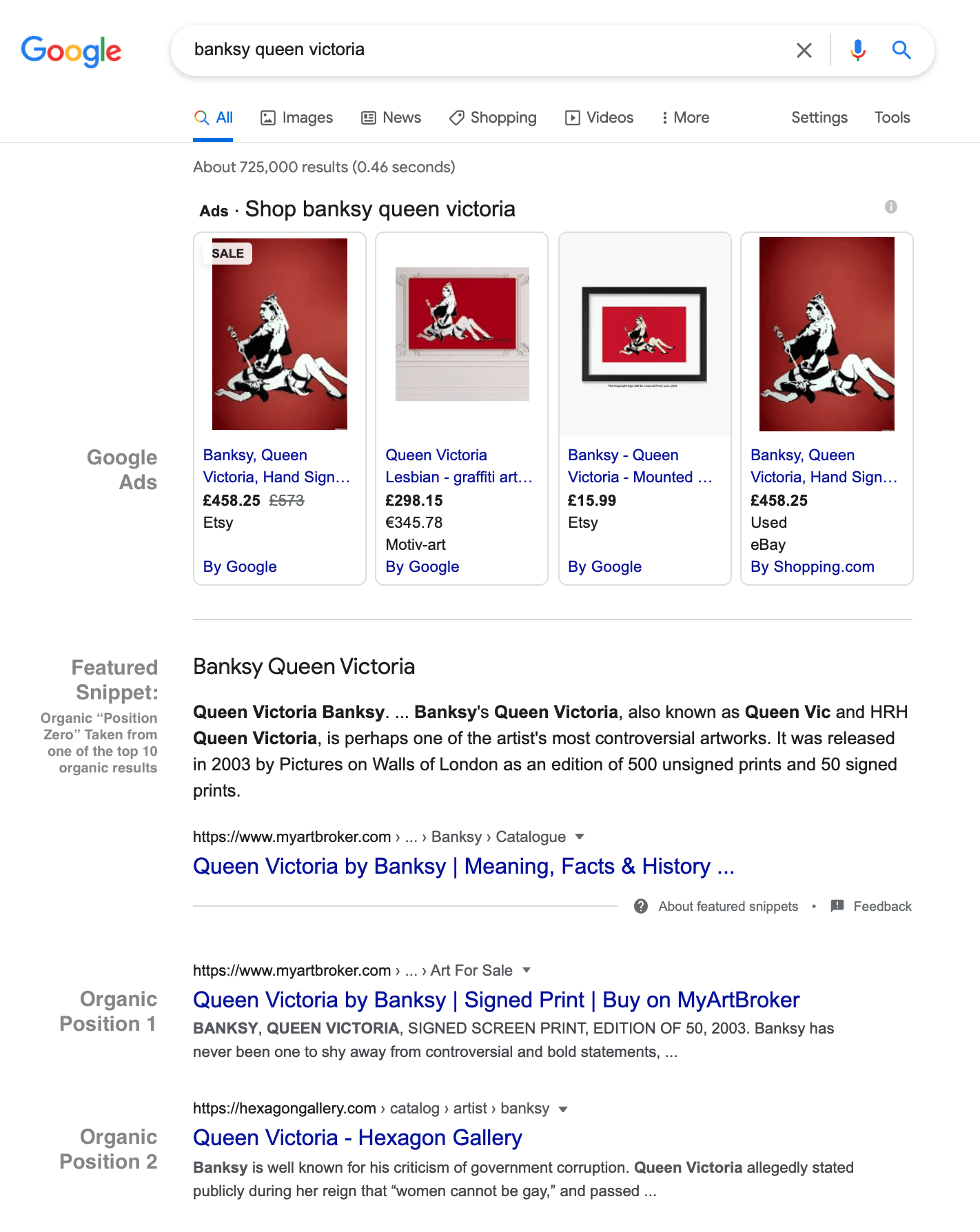At Seeded Digital, we advocate the importance of a solid search engine optimisation strategy to complement a cross-channel digital marketing approach. But we do understand that SEO can appear complicated, and for busy business owners and decision makers (possibly wearing several hats), that can be a barrier before you even begin. Investing in SEO can be a prickly issue when weighing up investment for short-term gain (e.g. cash-flow) vs mid-to-long-term growth and prosperity. But as more and more businesses look to bolster their route-to-consumer with direct-to-consumer (D2C) online commerce, not investing in SEO could create a compounding issue for you down the line. Here we try and give you the information you need to really grasp the nettle and identify if and when you should invest in SEO.
What is SEO?
SEO is the art and science behind making your website more visible in organic (non-paid) search, on a search engine like Google. This practice focuses on increasing the number of visitors, and the quality/relevance of these visitors, to your website by improving your search engine result rankings for key terms that are important for your organisation.
These organic (free) results usually appear directly below the top pay-per-click (PPC) adverts and include the standard blue link results, plus the rich result features that can readily appear, for example the "featured snippet" in "position zero".

Organic search can mean a variety of things, but the first port of call is Google. In the UK search market, Google accounts for 85.7% of all search volume (at time of writing). Others include Bing, DuckDuckGo, even Amazon is what we call a vertical search engine (product search engine). But SEO in the UK is really the science behind getting a website to rank well in Google Search, i.e. ranking for the key terms that are important to you, your business, your product.
It’s important to clarify at this point that it's not all about search volumes. If you're just starting out, then it's usually a good idea to go after more niche key terms with high purchase intent that your company absolutely satisfies. We know it in the SEO business as the 'longer-tail'. For example, if your company sells coffee for home delivery, then don't optimise for the term "coffee". Massive search volume, yes, but far too competitive. Plus not particularly close to purchase. What did the searcher mean? Coffee capsules, coffee shop, raw coffee, investing in coffee...? Instead, focus on the exact version of coffee that you sell - "coffee home delivery" perhaps.
The challenge is to be able to balance short-term gains with longer-term aspirations in search, and deliver a return all the way along. Sure, we want to rank for relevant search terms with lots of volume, but so does everyone else. Start with what you can truly answer and offer an exemplary user experience for. That's your foundation of expertise that will drive your early organic traffic. Build up from there.
back up
How does Google organic search work?
First Google sends out computer robots to visit all the links they can find on the internet (imagine a robot clicking all the links and buttons on your website and then imagine it doing that for every website out there). That does the job of discovering all the web pages Google might want to consider showing in a search result.
That list of webpages is then given to an 'indexer' to go and look at those pages and figure out what's on them and what they're about. A version of each page is then stored, along with Googles notes on what it thinks the page is about. Think of a library, but on an absolutely biblical scale! For more details straight from source, check out the video below from the "What's New In Search" session from Google I/O 2021 (timestamp: 1:40).
Then the ranking algorithms are applied to decide which pages should be surfaced in Google search and in what order for which keywords or topics. That process is based on hundreds of signals pertaining to relevancy, authority and user experience.
So in essence, you need to let Google into your website to find all your pages (technical SEO). You need the right content to show what you're about and label it in a way for Google to surface it in the right place (on-site and on-page content strategy). Then you need to make sure you're creating the signals to tell Google you should be top of the pile when someone does a Google search (off-site SEO & digital PR).
back up
Fast forward to 1:40 to get straight to the crawl/index/rank explanation.
What is Google looking for in a D2C website?
Google's automatic ranking algorithm is looking to reward high quality web pages. That means web pages and websites that demonstrate expertise, are authoritative and trustworthy (E.A.T.), and offer a great user experience (UX). Those quality signals come from your content, your website configuration and design, as well as how other websites reference your content (i.e. talk about it and link to it).
Google rewards websites that deliver on the hundreds signals that indicate these areas of high quality. The signals it looks for will vary a bit by industry but it's a variation on theme. If Google can recognise your signals are stronger than your competitors, it will rank your website above them.
It goes without saying that eCommerce websites are not the same as websites that deliver health advice, and Google considers them differently in terms of the signals required to rank well. But the EAT and UX ideal is a very useful guideline to follow in either scenario to ensure the necessary quality threshold is reached.
back up
Why should a D2C business owner invest in SEO?
When the global pandemic happened in 2020, we saw a huge upheaval in how consumers transacted business and how they purchased products. Suddenly the digital market place has become even busier. A large increase in digital footfall and eyeballs searching for products will stay, and as a result you need to be visible as competition increases.
If you look at the websites of businesses that have been around for a while, you’ll see that organic traffic often ends up the most influential channel, in terms of traffic volume. Organic search is also the most cost-effective source of traffic over time due to the comparatively low-cost of creating and optimising content (and therefore search assets) that you own and can embellish and build out over time. Done correctly, this has a compounding effect, compared to e.g. paid media that disappears without a trace as soon as the spending tap is turned off.
It’s become clear that many businesses needed to adapt and adopt a direct-to-consumer strategy, with less reliance on the wholesaler. To do this properly you need to be discoverable via search engines, and a huge part of what is found in search engines is down to SEO.
back up
We hope you're enjoying our take on SEO for direct-to-consumer (D2C) businesses and if you would like to find out more about working with Seeded Digital, please feel free to get in touch via our contact form at the bottom of this page or email us via info@seeded.digital.
Where do I start?
The absolute foundation is figuring out what people are searching for in relation to what you sell. The whole point with search is you're not putting your content on a billboard and interrupting people who are doing something else. You're tapping into an existing flow of intent. People are already there in the search engine, actively searching to fulfil a need.
In figuring out your fit against that existing traffic flow, consider:
- What do you sell?
- What do you do?
- What are you good at?
- What do you want to talk about?
- What are the things that you do that people could be interested in?
You then need to target those topics and areas of interest with appropriate content, remembering the principals of EAT. Generally speaking, by brain dumping around the questions above you can arrive at your ‘seed’ terms which you can then use to investigate your full keyword landscape using a tool like SEMrush, Ahrefs or MYPOSEO.
A bit more technically, SEO is the process of figuring out how people are searching for the products and solutions that your brand can solve. Typically, a search will start broad for a key term that has a comparably large amount of search volume. As the user educates themselves through searching, they become more aware of the specific thing they are after which is then reflected in their refined search queries (this is typically what we call in SEO the longer-tail versions of the broad search terms the user started with).
The long-tail tends to have lower search volumes per key phrase but much higher conversion intent. The broader head-term will tend to have higher volume but lower intent. Ideally, we want to optimise for both, but starting with the higher intent longer-tail tends to be a great place to start and more important for your conversions. It will also help with the optimization process for the broad term, which tends to be more competitive and takes longer to optimise for.
The cautionary tale here is to not blinker yourself with big volume vanity head terms rather than capturing the higher intent lower volume long-tail which, incidentally when you put all the long-tail together, tends to amount more volume than the head term. This is an incredibly common misinterpretation of what SEO should be delivering.
back up
Does investing in SEO today give immediate results & mean saving money on paid advertising?
The quick answer is 'no' on both counts.
Paid search and SEO work hand-in-hand and should usually work hand-in-hand whatever stage your business is at. If you're going from a standing start you need to build all of the things from the ground up, and Kew Gardens wasn’t grown in a day!
That said, if you have an existing website with a lot of latent ranking value that isn’t being leveraged then the answer will be 'yes' - you’ll see a boost when we remove the ranking blockages. So as always with these questions, it depends.
back up
What happens if I stop spending on SEO, will my investment continue to pay-off?
Yes. But the pay-off will lessen over time.
With Paid Media you pay, and you see results immediately. Yes, you need to optimise, but in general terms you put the money in and your ads start appearing immediately. With SEO, you invest, build credibility in Google over time and then start appearing in search in positions of click through.
Here's the important point: turn off paid media and all ads disappear as if you were never there.
Turn off SEO spend and you’ll see a bleed in results over time, but essentially you have an asset that stays and your search results remain visible. So an initial intensive project to get where you want to be, followed by a maintenance budget is popular (with some caveats - if you're a publisher then not so much).
Once your organic channel starts performing, you have the opportunity to review your paid media strategy. This is when the two channels can really start working together and the point where 1+1 can start to equal 3.
back up
If SEO is so important, why isn’t everyone doing it?
Limited budgets and latent payoffs.
Given the fact it requires investment up-front and budgets are limited, particularly for start-ups and SMEs, it is tempting for businesses to focus entirely on instant gratification channels and put off doing SEO. The fact it can end up being your most efficient and abundant source of traffic in the long term, is lost.
If you're a very young start-up, and you need to get your cashflow moving, then SEO is not the first play. There are some considerations you should build into your process, but it’s not going to be a significant investment at this point.
Once cashflow is moving and you’re scaling up, or you’re an SME looking to grow, this is the point when it's easy to ignore SEO. Instead, this is where savvy businesses invest for exponential gains in the mid and longer-term.
back up
Conclusion
Of all the digital channels, SEO has the largest number of moving parts. That makes it difficult to understand and to feel confident investing in. However, the potential gains make it un-ignorable, and with the right partner much of the anxiety around investing can be removed. Have a plan to invest in SEO and time it right to maximise your short-term cash-flow as well as your future potential.
Let's get growing.
Resources & Further Reading
Wikipedia - Vertical Search (what is a vertical search engine?)
Statista - Market share held by the leading search engines in the United Kingdom (UK) as of January 2021
Search Engine Journal - How Paid Search Incrementality Impacts SEO (Does 1+1=3?)
Search Engine Journal - Google’s E-A-T: Busting 10 of the Biggest Misconceptions
Moz - E-A-T and SEO: How to Create Content That Google Wants
Software: Myposeo
Software: SEMrush
Software: Ahrefs
About Seeded Digital
We're a small and fiercely independent search marketing agency with our own unique way of doing things. We enjoy working with like minded start-ups, scale-ups and SME’s who prioritise getting things implemented and getting results. We're based in London and service clients UK-wide.


